Buying land in Thailand as a Foreigner; Is It Possible?
If you follow my Instagram, you’ll know I plan to build a house in Thailand. Actually, I started this week (EDIT 2023 – IT’S NOW COMPLETE, you can read about my step-by-step process building a house in Thailand as a foreigner HERE!)! I’ve been inundated with questions about Buying land in Thailand, buy a house in Thailand, building a property in Thailand, can foreigners buy land in Thailand etc, so I thought I’d share what I know about the subject after 10+ years in Thailand.
This will be one of many blog posts I write about the process of buying property in Thailand, and ultimately me building a house in Thailand. So let’s get started.
Table of contents
- Buying land in Thailand as a Foreigner; Is It Possible?
- Can foreigners own property in Thailand?
- Buying Land in Thailand as a foreigner; 4 ways to do it:
- So can foreigners own a property in Thailand, or not?!
- What’s the process of buying land in Thailand
- What if you don’t have a Thai partner?
- How much is land in Thailand?
- What does 1 Rai mean, and how many square feet or meters in 1 Rai?
- Final thoughts on buying property in Thailand?
- 2023 EDIT: Our finished house:
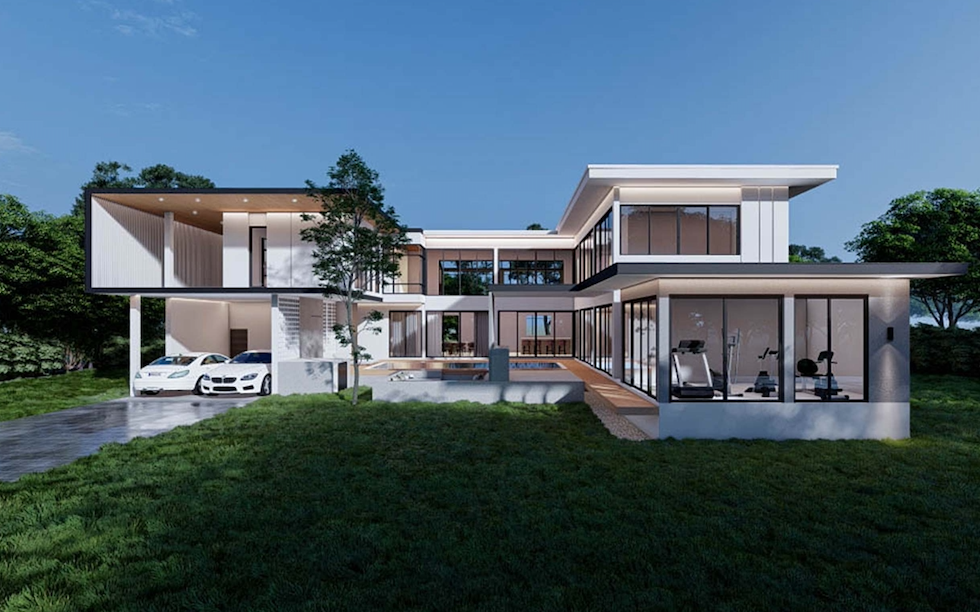
Can foreigners own property in Thailand?
The is the number one question about living in Thailand. How do you go about buying land in Thailand as a foreigner? Also, how about condos in Thailand? Let me explain:
Condos
Can foreigners buy condos in Thailand? Yes, they can. In fact, I bought a small 2-bed condo in Bangkok way back in 2013. I now rent it on AirBnB, you can check it out here. I also bought an investment condo in Chiang Mai to use with airbnb last year. It was about $130k USD, You can see that here. With that, there are a couple of things to remember.
Foreigners can only own 49% of the condos in a condo block. So if there are 100 condos in the building. Foreigners can only own 49 of them. Generally, this isn’t an issue though. So don’t think too much about it.
Why can foreigners buy a condo? Because you don’t own any land. That’s why. But yes, the condo you buy is 100% in your name. No Thai people are necessary. The deeds and registration in the land office are all in your name. All good.
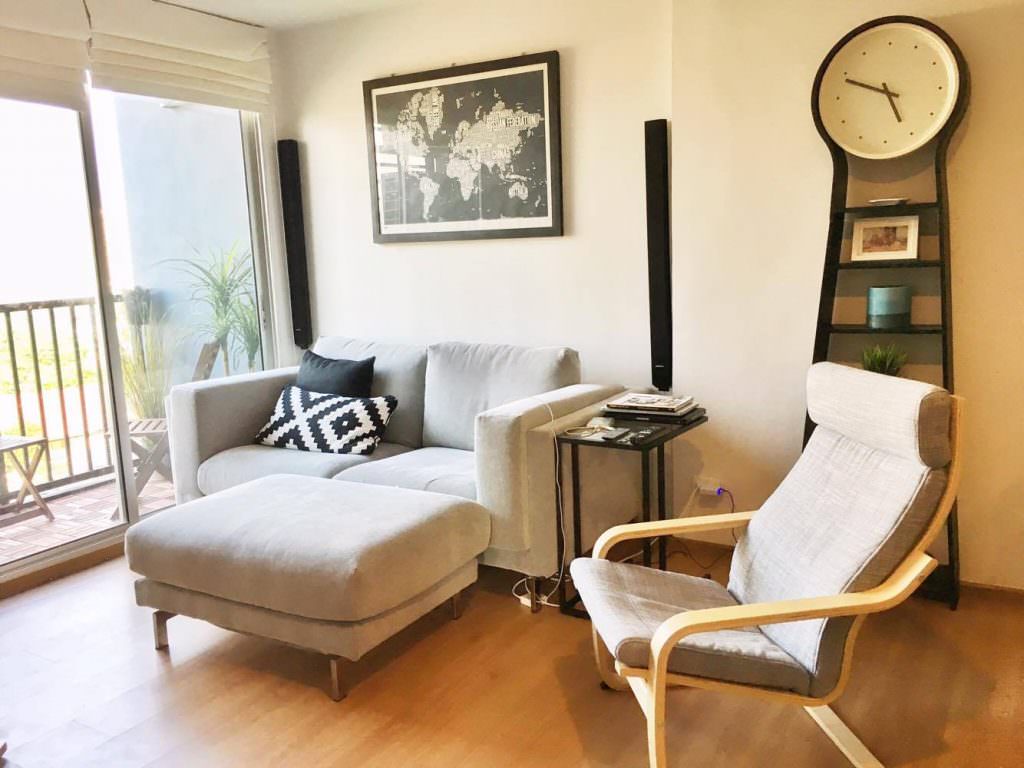
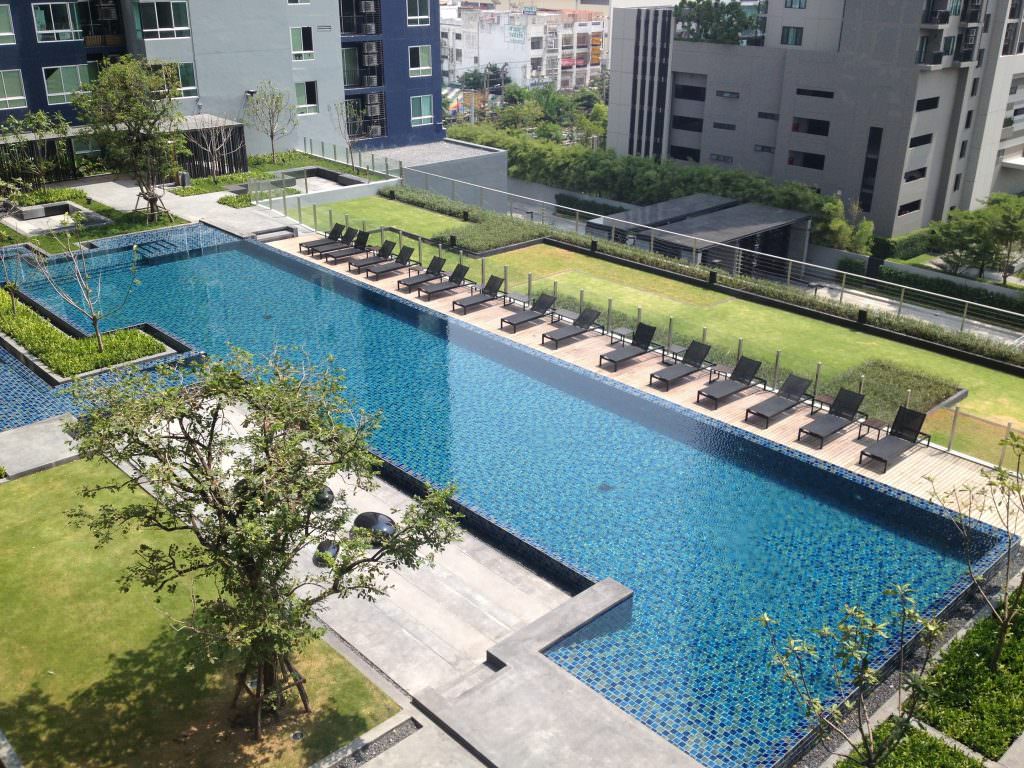
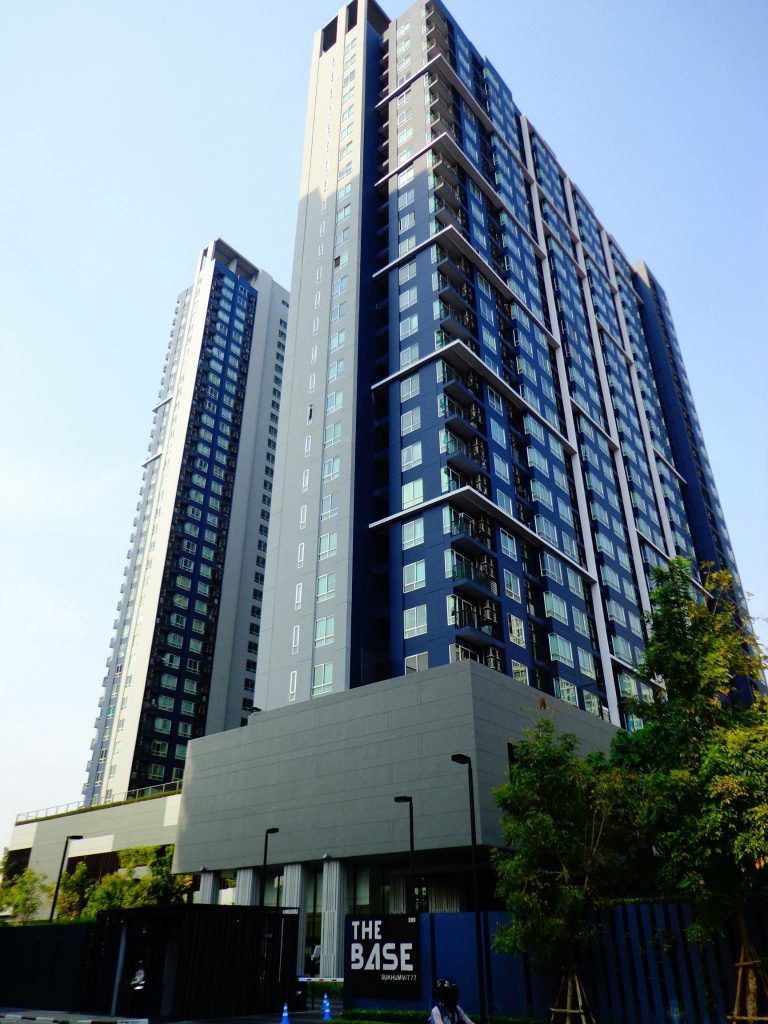
Land
Can foreigners own or buy land in Thailand? Technically, 100% no. But many foreigners do ‘own’ land and houses in Thailand. How? I’ll explain that in the section below.
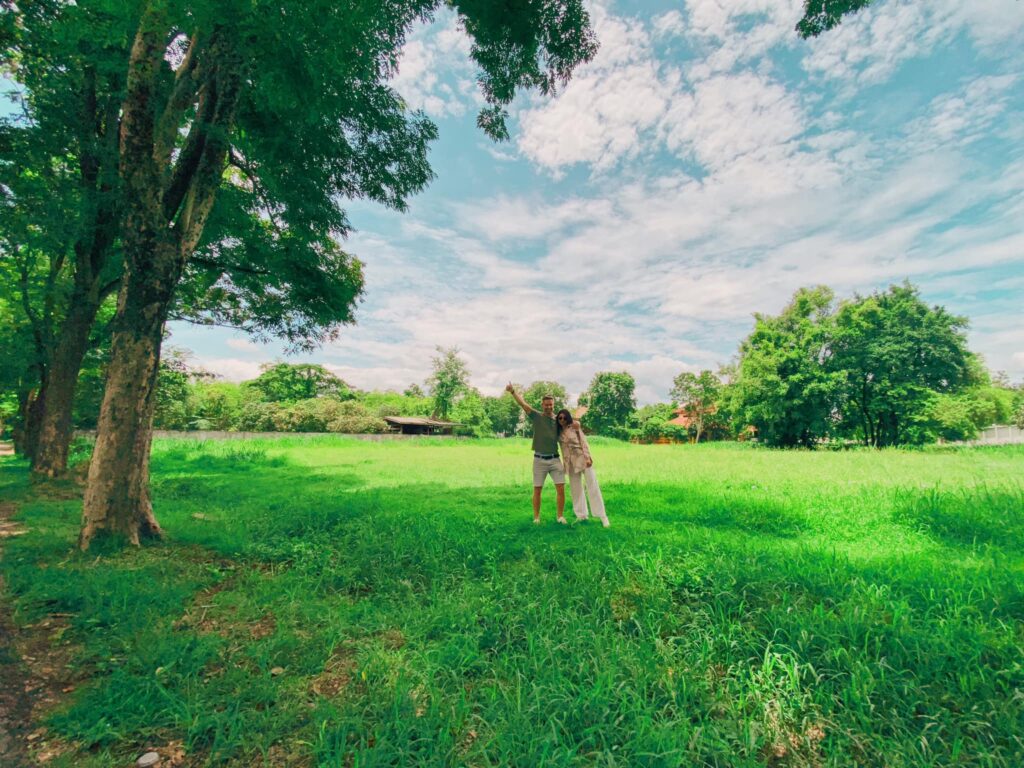
House
Can foreigners buy or own a house in Thailand? Yes. Foreigners can own a house, but only the actual building, not the land it sits on. I’ll explain more below.
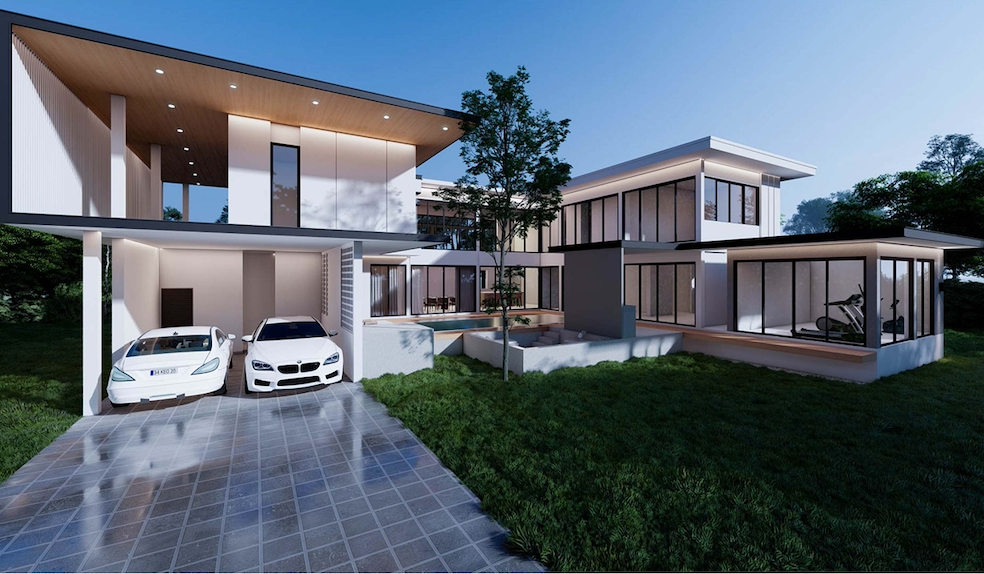
Buying Land in Thailand as a foreigner; 4 ways to do it:
Ok, the complicated bit. So, you now know the basic answer. Can foreigners buy or own land in Thailand? On a technical level, no, they can’t. Don’t believe or listen to anyone who tells you otherwise. But in a practical sense, you can. So how do people (like me) build a house in Thailand?
There are a 4 ways for foreigners to buy or build property in Thailand. None are perfect but some are ok. Here they are:
1) Registering A Thai Limited Company
This is the oldest trick in the book. On the surface, you can register a company in Thailand, and then the company can own 1 piece of land, with which you can build a building on. Easy? Not quite.
The Thai company legally needs to be a REAL company. And the company must have at least 3 shareholders, where Thai people must own a minimum of 51%, and you can only own 49%.
In years gone by, lots of foreigners did this, and there were (and still are) law firms who have hundreds of Thai people on their books who they pay cash-in-hand to be ‘nominee shareholders‘ of numerous companies. They don’t even know the companies they are supposed shareholders of. And then the foreigner could build his or her house. You should file accounts yearly, and the building ‘should’ be used for your business (not a home, although in practice everyone builds a home!). It’s really common. And there are almost no examples of people losing their homes.
Thailand now is cracking down on this sort of thing. So personally I, nor any lawyer I spoke to, would recommend this. However, I have 2 close friends who have done this successfully for over a decade.
Who is it suitable for?
For someone who has their own business or with a bit of an appetite for risk.
Pros/Cons
PROS:
- You can ‘own’ a piece of land and build a house!
- You don’t need a Thai partner
CONS:
- It’s illegal unless you are really doing business in Thailand
- It’s expensive as you need a lot of lawyer time to set up, and then yearly lawyer time to file accounts etc for your company
- You need Thai people to be shareholders, you either need to trust them, or trust your lawyer.
- You need to file accounts every year for forever or your right to the property will be lost
2) Thai Person’s/Partner’s Name
The easiest, and the most dangerous option. You have a close Thai family friend? You can put the name of the land in their name, and the house in their name, and trust that they won’t sell it or have you kicked out. Which they legally are eligible to do.
Or if you’re in a relationship with a Thai, do it in their name. There are 1 million and 1 horror stories in every bar in Thailand of (mostly) guys losing their last penny doing this. Be careful.
Who is it suitable for?
Someone with either a lot of money, and this option represents a small part of their net worth. Or someone who REALLY trusts a Thai national to never cheat them.
Pros/Cons
PROS:
- The easiest option. Almost zero paperwork.
CONS:
- The Thai person can kick you out, or sell the land or property at any time of their choosing.
3) 30 year+ Lease
This can work 2 ways, both involve Thai law permitting leases of land up to 30 years to foreigners.
- First, you literally simple lease a piece of land for 30 years with no purchase of any land. Then build your house. In 30 years, your time is up and you either renegotiate another 30 years, or you lose your building and move on. People have tried to get around this by the mythical ‘30+30+30 year lease‘. Where you essentially get your 30 year lease (which is 100% legitimate) and then a pre-signed guaranteed contract of another 30 years, and another. These are not enforceable by Thai law. Be careful. That’s not to say there aren’t instances that this is done in good faith and is made good upon. Just that it’s not legally enforceable.
- The same concept as above, but if you’re in a (hopefully!) long term relationship with your Thai partner, you ‘gift’ them the money for the land and they buy the land in their name. They then lease the land to you for 30 years.
Who is it suitable for?
Someone who doesn’t have a Thai partner (in the case of number 1 above) but wants to have a base in Thailand for 30 years. And that 30 years is enough fo rthem. Or someone with a Thai partner, and they don’t want the stress/hassle of the usufruct/superficies.
Pros/Cons
PROS:
- Simple legal contract that is legally enforcable
CONS:
- Not transferrable
- Not passed on via inheritance
- You don’t ‘own’ anything
- Maximum use of 30 years
- 1.1% fee of land value due
4) Superficies or Usufruct
Woah this is getting confusing, don’t worry, nearly there. The next option is to get either a ‘Superficies’ or ‘usufruct’. These are generally what people who are married to a Thai will use.
- Usufruct: Easier, cheaper and more well known that a superficies. A Usufruct is an agreement “temporary transfer of ownership rights from one person to another for the use and enjoyment of the property”. So you basically get to use the land for your lifetime. It is not transferrable through inheritance.
- Superficies. The is the best option if you plan to buying land in thailand, and build a house in Thailand. A foreigner will own 100% of the building on the land, and have the right to use it for their entire life, and have the right to pass it on via inheritance. A superficies “automatically transfers the ownership over something that is built on leased land” and allows the transfer of that property to 3rd parties.
Foreigners legally own the house (not the land). A superficies is inheritable. And a superficies may be transferred to a third party,
Who is it suitable for?
People married to a Thai but want to protect their investment and have legal rights to their house in Thailand.
Pros/Cons
PROS:
- BOTH: Lifetime use of the land and buildings on the land
- BOTH: You OWN the building
- No-one can kick you off our land even if you separate from your partner
- No-one can sell the land or building without the foreigners signature
- SUPERFICIES: Inheritable and transferrable
CONS:
- The Thai land offices don’t like to grant either, even though they are 100% legal and part of Thai law. Superficies being even more difficult to force through than the Usufruct. May involve some ‘tea-money’ to get it over the line, so I’ve heard (cough cough).
- Lots of paperwork to get it up and running, and with that thousands of dollars of legal fees
- You still don’t own the land on a technical level. For me, that’s fine because in a practical sense you essentially do own it. But I know a lot of people still don’t like it.
Final note on Usufruct vs Superficies: ““The usufruct gives the foreigner temporary ownership in land and buildings, while the superficies grants unlimited and inheritable house ownership on foreign land.”
5) $1.3m Investment Method
If you invest 40MTHB ($130,000USD) you can buy 1600 m2 (1 Rai) for a residential property. The 40m THB must be invested through the Thai authorities and their channels.
Who is it suitable for?
Rich peope who can whack 40mTHB ($1.3m) into the Thai economy without worrying about the returns. But want to own or build a luxury place in Thailand. To be honest, if you’re rich, and you spend $1m or so on this, if you build a luxury property you’ll probably get that value back when it’s done. If I had more cash, this is what I’d do.
Pros/Cons
PROS:
- The only legal way to own a residential property and land in Thailand
- You’re a boss
CONS:
- $$$
So can foreigners own a property in Thailand, or not?!
After all that, the bottom line is that:
- YES, Foreigners CAN 100% of a condo in Thailand
- YES, foreigners CAN own a house in Thailand (under a superficies contract)
- NO, Foreigners CANNOT explicitly own land under their name (unless they invest $1.3m)
- YES, Foreigners CAN own 49% of a company which owns the land
- YES, Foreigners CAN lease land for 30+ years and do what they want on that land
What’s the process of buying land in Thailand
It depends on which route you go down. The lease, the company registration, or the superficies/ufustruct. If it’s the latter, like I did, then these are the steps:
- Identify the land you want to buy
- ‘Transfer’ the money to your Thai partner, and they purchase the land.
- Your Thai partner buys the land, and you go to the land office to transfer the land title deeds (known as a ‘Chanote‘ in Thailand) to the Thai. They now legally own the land.
- You both sigh the superficies/Usufruct contract with a witness and a lawyer.
- Wait a month, find a nice land-office officer go back to them and update the ‘Chanote‘ with your details (the foreigner) with lifetime use of the land. Your name, as a foreigner, is now ON THE LAND DEED.
- When you start building your house, when you register the building the first time, again you need a friendly officer, then register the building in your name, and get started.
- You know OWN a house in Thailand (but not the land, but you do have 100% legal right to the land for your lifetime).
What if you don’t have a Thai partner?
If you don’t have a Thai partner, then the best option is the 30 year lease on land, or of course a condo purchase. Or, if you can find a trustworthy developed to do the Usufruct or Superficies through.
On a side note, I’m thinking of getting more involved in real estate and may set this up to be honest.
How much is land in Thailand?
I should really address this, because if you want to live somewhere ‘mainstream’ buying land in Thailand is not cheap, not by a long shot.
In Thailand, they use a different term to measure land, the Rai, made up of 400 Talang Wah (explained below). Normally, within a city, a house would require somewhere between 50 Talang wah (200 square meters) to 100 (400 square meters) Talang Wah for a normal house plot size. So for easy maths, let’s say we need 100 Talang Wah for this example. How much is land in Thailand?
City or Country?
If you want to buy in Bangkok city centre, or Chiang Mai City Centre, or near the developed beaches in Phuket or Koh Samui etc. Then you can EASILY spend, for 100 Talang Way (400 square meters, 4,300 square feet) plot upwards of $1,000,000USD. With Bangkok being the most expensive.
I look at a plot near Nimmanheiman, the main area in Chiang Mai, about 100 square wah and about 10 minute walk from Maya Mall on the far side, it was about $750,000. Not cheap!
Equally, if you buy land in the middle of nowhere. in Issaan province, or in the jungle somewhere it’s super cheap. There are no roads, no water, no electricity, and no internet. There you can pick up 1 Rai for as little as $5,000! But then what do you do?! Build a road?!
Me? I simply can’t afford $1m to be walking distance from Chiang Mai city centre. So I bought a 300 square wah plot (1,200 square meters/13,000 square feet) about 15 minutes drive from the city centre, in Hang Dong. It cost a little under $200kUSD, which is a fortune to me, especially to put in someone else’s name temporarily. So yeah, if you want to live in a cool place, it’s not cheap to buy land in Thailand!
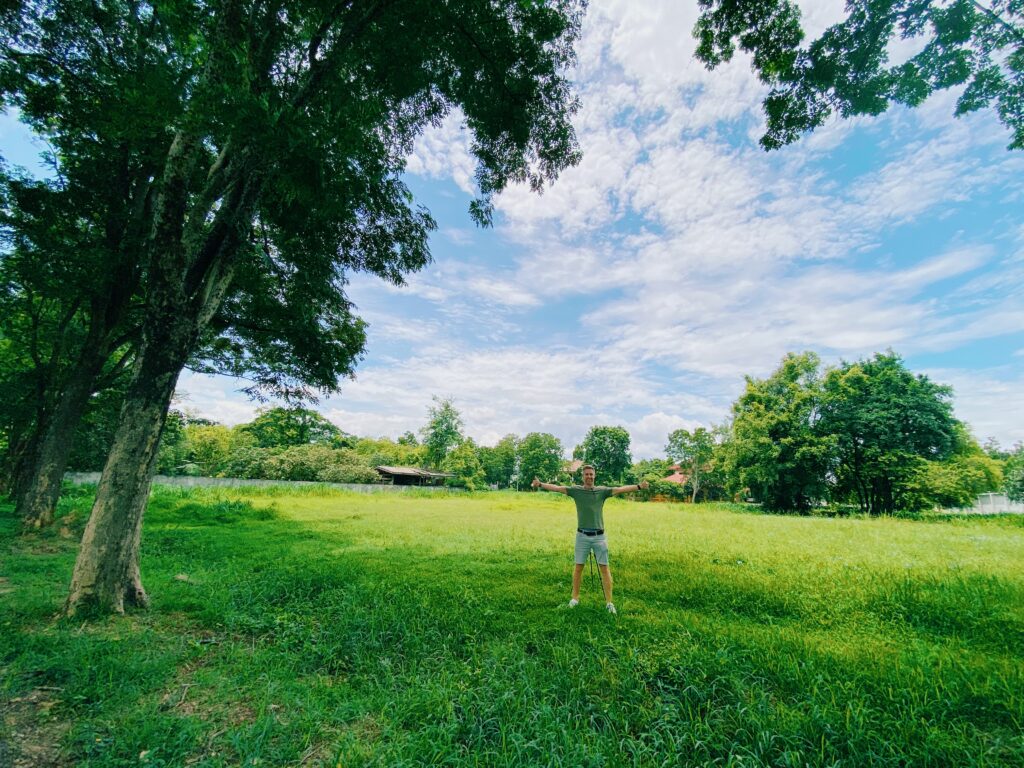
What does 1 Rai mean, and how many square feet or meters in 1 Rai?
Thailand uses a different measurement system for land than other countries. It uses something called a ‘Rai’. 1 Rai is made up of 400 ‘Talang Wah’. Confused yet? Don’t worry, this is how it’s broken down:
| UNIT | SQUARE METRES | SQUARE FEET |
| 1 RAI | 1,600 | 17,222 |
| 1 TALANG WAH | 4 | 43 |
| 1 ACRE | 4,046 | 4,3560 |
If you use acres (why?!), that means 1 Acre = 4,046 square meets = 2.5 Rai.
Final thoughts on buying property in Thailand?
Firstly, HAVE A GOOD LAWYER! I spent about 100,000THB maybe a bit more (somewhere between $3,000 to $5,000 dollars) to get my stuff sorted. It’s money well spent. Email me if you need help with that, or message me on instagram.com/onestep4ward.
In Ireland, the US and the UK anyone can buy houses, apartments, land or condos. It’s not like that in Thailand, and most likely it never will be. But don’t be put off, there are ways to make it happen, ESPECIALLY if you have a Thai partner, but it’s still possible even without.
Building my own dream home has been an obsession since I was a kid, growing up in a small house in Ireland, my mum stuck in a box-room without space even for a wardrobe. I moved to Thailand way back in 2007, and started making money from my blog in 2012, since then I’ve been humble, stayed in our small 2-bed when I could have rented somewhere plush, drive a $1,000 2002 honda civic, and it all leads to building my house in Thailand.
The process started when I began researching land back in 2019, but I started seriously looking in February 2020.
Finally, the land section is done, now construction starts! I’ll blog that bit next. Hope this cleared a few things up about buying land in Thailand or building a house in Thailand. THANKS!
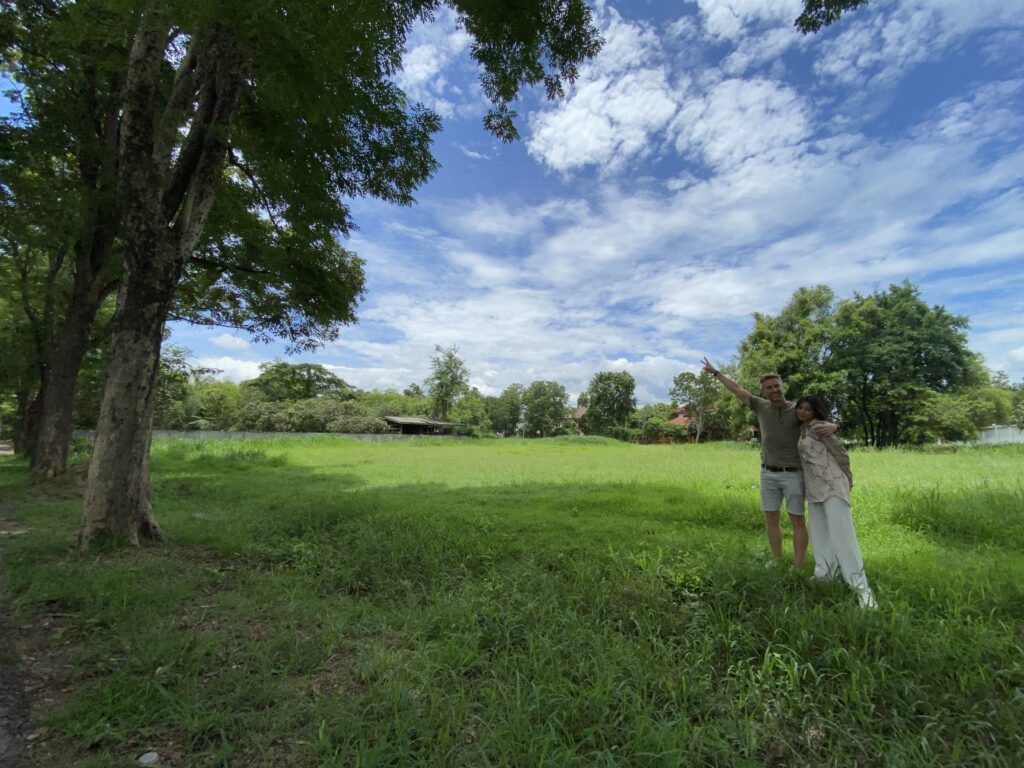
2023 EDIT: Our finished house:
Here is the finished product:
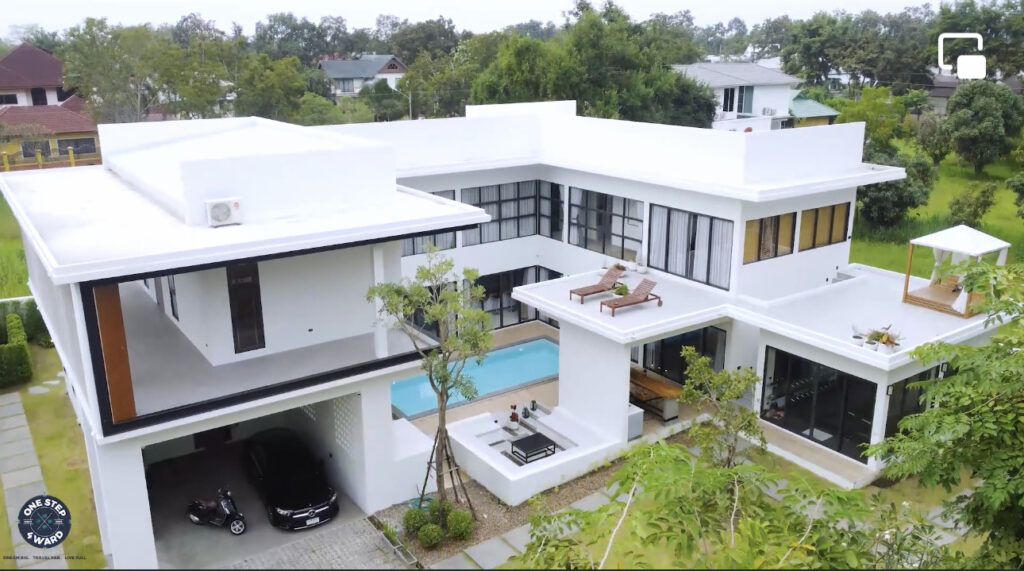
Remember, never travel without travel insurance! And never overpay for travel insurance!
I use HeyMondo. You get INSTANT quotes. Super cheap, they actually pay out, AND they cover almost everywhere, where most insurance companies don't (even places like Central African Republic etc!). You can sign-up here. PS You even get 5% off if you use MY LINK! You can even sign up if you're already overseas and traveling, pretty cool.
Also, if you want to start a blog...I CAN HELP YOU!
Also, if you want to start a blog, and start to change your life, I'd love to help you! Email me on johnny@onestep4ward.com. In the meantime, check out my super easy blog post on how to start a travel blog in under 30 minutes, here! And if you just want to get cracking, use BlueHost at a discount, through me.
Also, (if you're like me, and awful with tech-stuff) email me and my team can get a blog up and running for you, designed and everything, for $699 - email johnny@onestep4ward.com to get started.
Do you work remotely? Are you a digital nomad/blogger etc? You need to be insured too.
I use SafetyWing for my digital nomad insurance. It covers me while I live overseas. It's just $10 a week, and it's amazing! No upfront fees, you just pay week by week, and you can sign up just for a week if you want, then switch it off and on whenever. You can read my review here, and you can sign-up here!







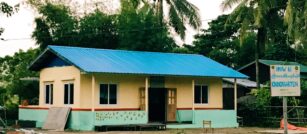





 As you know, blogging changed my life. I left Ireland broke, with no plan, with just a one-way ticket to Thailand
and no money. Since then, I started a blog, then a digital media company, I've made
more than $1,500,000 USD, bought 4 properties and visited (almost) every country in the world. And I did it all from my laptop as I
travel the world and live my dream. I talk about how I did it, and how you can do it too, in my COMPLETELY FREE
Ebook, all 20,000
words or so. Just finish the process by putting in your email below and I'll mail it right out to you immediately. No spam ever too, I promise!
As you know, blogging changed my life. I left Ireland broke, with no plan, with just a one-way ticket to Thailand
and no money. Since then, I started a blog, then a digital media company, I've made
more than $1,500,000 USD, bought 4 properties and visited (almost) every country in the world. And I did it all from my laptop as I
travel the world and live my dream. I talk about how I did it, and how you can do it too, in my COMPLETELY FREE
Ebook, all 20,000
words or so. Just finish the process by putting in your email below and I'll mail it right out to you immediately. No spam ever too, I promise!
